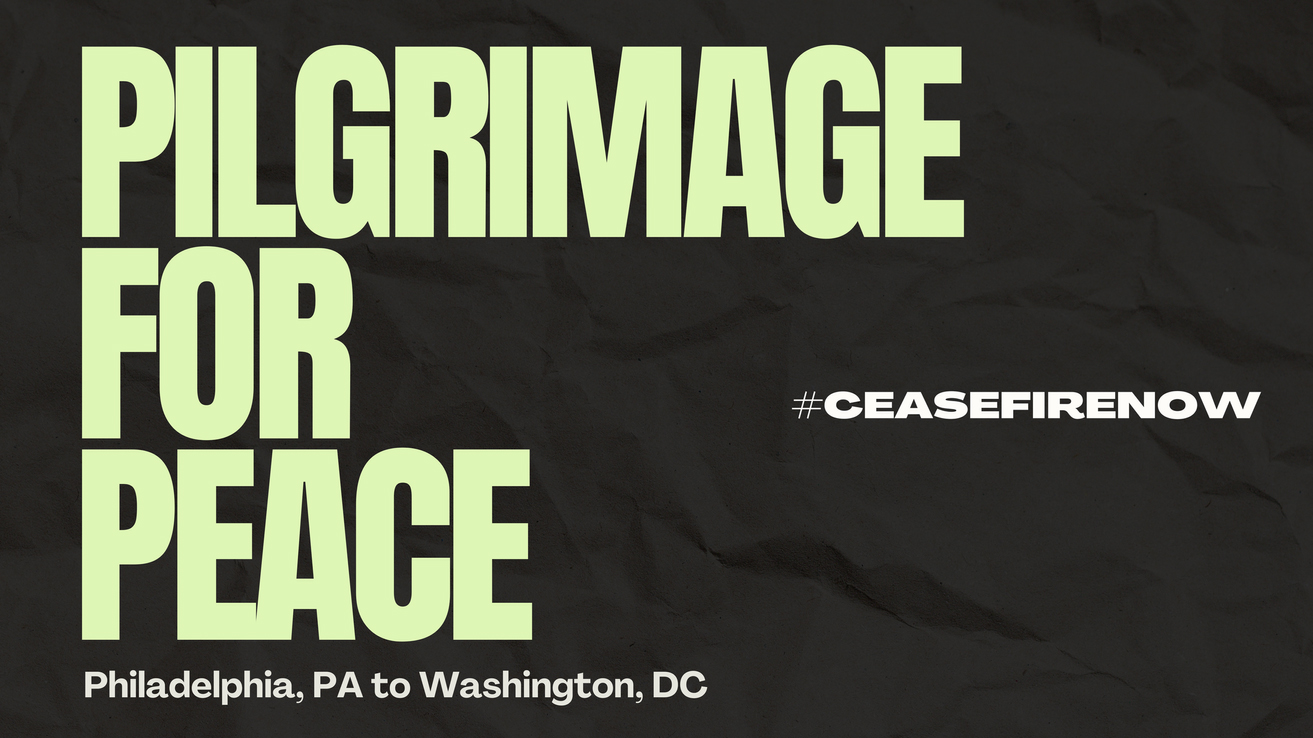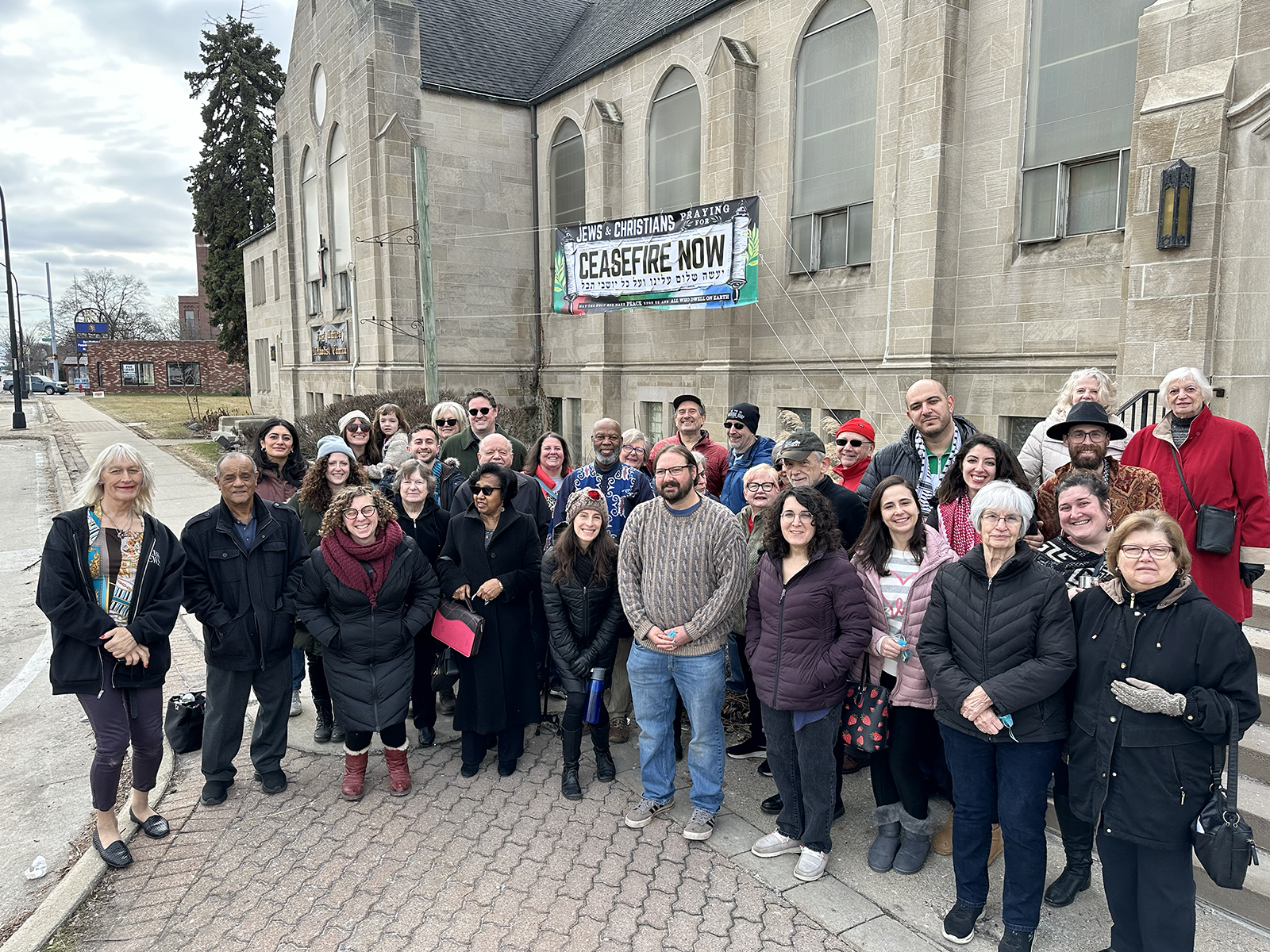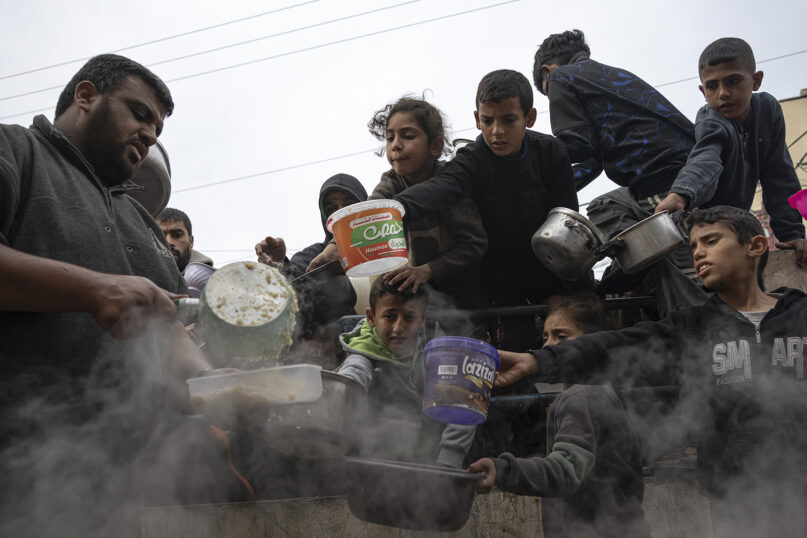(RNS) — When the Rev. Stephen Green began planning a march from Independence Hall in Philadelphia to the White House to urge an end to the war in Gaza, he settled on what he hoped was an auspicious start date: Wednesday, Feb. 14, Douglass Day.
The day, honoring the life and legacy of famed 19th-century abolitionist and orator Frederick Douglass, seemed an appropriate occasion to make a moral case to President Joe Biden and his administration to stop supporting Israel’s ongoing assault in Gaza that has killed 28,000 Palestinians.
The Peace Pilgrimage, an eight-day march, has expanded to include a host of sponsors, including the National Council of Churches and other interfaith groups. But at its core, it is an effort led by the organization Green founded four years ago, Faith for Black Lives.
For many Black Americans, the Palestinian cause has emerged as a central plank in the ongoing struggle for civil rights. In November, more than 1,000 Black pastors representing hundreds of thousands of congregants bought a full-page ad in The New York Times calling for a cease-fire and the release of Israeli hostages in Gaza. African American writers, athletes, celebrities and elected officials have spoken in support of Palestinians. Some have even likened the renewed energy in support of Palestinians to the fervor of the Black Lives Matter movement that came in 2020 after the killing of George Floyd.
“We’re carrying this message to remind America of the values that she was birthed in and to be a leader in this moment to provide a moral vision for the world,” said Green, who is also pastor of St. Luke AME Church in New York City’s Harlem.
RELATED: Black Christian leaders call for cease-fire in Gaza
The 25 or so supporting organizations that will march on average 10 miles a day include a few groups with Muslim members — the Maryland chapter of the Council on American-Islamic Relations and the U.S. Campaign for Palestinian Rights.

Pilgrimage for Peace poster. (Courtesy image)
And it also includes a host of Jewish-led organizations and synagogues, all on the far left of the U.S. Jewish scene. Conspicuously absent are mainstream Jewish organizations that have resisted calls for cease-fire, believing Israel’s war on Gaza is just.
While U.S. Jews and Black Americans often see themselves as like-minded progressives — both bulwarks of the Democratic Party — they have historically had a fraught and often tense relationship, and they part ways when it comes to Israel.
The Rev. Martin Luther King Jr. enjoyed good relations with American Jews and was famously flanked by Rabbi Abraham Joshua Heschel in his 1965 Selma to Montgomery march. In 1964, two Jewish civil rights workers and a Black man were murdered trying to register Blacks to vote in Mississippi. But that period of civil rights alignment between Blacks and Jews was short-lived.
The Black Power movement of the 1960s backed Palestinians over Israelis creating tensions with U.S. Jews. Malcolm X visited Gaza in 1964 and expressed anti-Zionist views soon after. The Student Nonviolent Coordinating Committee and the Black Panther Movement were solidly pro-Palestinian, said Michael Fischbach, a historian who wrote “Black Power and Palestine: Transnational Countries of Color.”
“They understood that there was a worldwide uprising of what today we call people of color,” said Fischbach. “They were rising up, they wanted revolution, they wanted independence and freedom on their own terms.”

The Rev. Stephen A. Green. (Photo courtesy of National Council of Churches)
That meant siding with stateless Palestinians who either fled or were violently displaced during Israel’s War of Independence in 1948. Later, many more Palestinians became an occupied people when Israel captured the West Bank and Gaza in 1967.
Today, many Black Americans who support the Palestinian cause are not doing so out of the revolutionary fervor of the 1960s. The group Faith for Black Lives defines itself as “grounded in the principles of Kingian nonviolence.” They view the Palestinian cause in the context of the African American experience of oppression and subjugation.
“This is a spirit journey for us to call the nation into consciousness as it relates to poverty, war and racism,” said Green, the group’s founder.
Numerous polls show that African Americans, and more generally people of color, are more likely than whites to side with Palestinians. A Gallup poll from November showed that 64% of American people of color (including Black, Hispanic, Asian, Pacific Islander and Native American adults) disapproved of Israel’s actions in Gaza, compared with 36% of white Americans.
For Lisa Sharon Harper, a prominent evangelical activist, the war in Gaza spurred her to action. Since the start of the war she has kept a commitment to post something about the war to Instagram every single day — now more than 120 posts.
She has also joined multiple campaigns, including the global Gaza Ceasefire Pilgrimage, a Lenten walk now planned in 85 cities in 12 countries.
“When I look at what’s happening right now in Gaza, what I see is a war against the image of God on earth. And so of course, I will stand and defend it,” she said.
Harper sees Palestinians as dispossessed people living behind walls and security fences, unable to vote or travel, and now homeless and starving. And she is furious that the U.S. administration is supporting this attack on a minority group.
“When we look at what’s happening in Gaza and we see our country saying ‘that’s OK,’ well, that means that we’re not that far from our country saying that’s OK if it happens to us,” she said, speaking of Black Americans. “Dr. King said injustice anywhere is a threat to justice everywhere. This is an existential threat for people of African descent in the West.”
The United States earmarked $3.3 billion in assistance to Israel in 2022. It has given Israel more aid than any other nation since World War II, about $260 billion. On Tuesday, the Senate passed a foreign aid package that includes $14.1 billion for Israel’s war in Gaza. It’s not clear if it will pass in the House.
A growing, but still minor, group of American Jews will march in the Peace Pilgrimage from Philadelphia to Washington beginning Wednesday, believing like African Americans and others that a cease-fire is imperative.
“This pilgrimage pulls on the threads of the Civil Rights Movement,” said Rabbi Alissa Wise, founder of Rabbis for Ceasefire. “It updates the Black Jewish alliance but also expands it further.”

A new banner outside First United Methodist Church of Ferndale, Michigan, reads “Jews and Christians praying for ceasefire now.” The church is also the home of Congregation T’chiyah, a Jewish synagogue led by Rabbi Alana Alpert. (Courtesy photo)
The Jewish contingent includes Rabbi Alana Alpert of Congregation T’chiyah in Ferndale, Michigan, north of Detroit. The congregation meets in a United Methodist Church and recently posted a banner outside the church building that reads “Jews and Christians praying for ceasefire now.”
Alpert said she was joining the march to be with like-minded people of different faiths in prayer and protest in favor of cease-fire and against the funding of U.S. tax dollars to Israel’s military.
“I have so few colleagues who are on the same page or who are even having the same conversation,” said Alpert, speaking of fellow rabbis in Michigan. “I know it will feel grounding and nourishing to have this time with other colleagues.The situation is so heartbreaking that I’m saying yes to any opportunity that I can.”
RELATED: Evangelicals venture to Israel in show of solidarity





